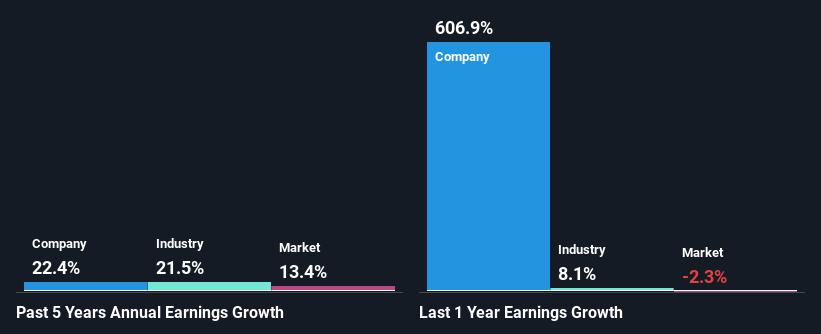Trip.com Group’s (NASDAQ:TCOM) stock is up by a considerable 27% over the past three months. We wonder if and what role the company’s financials play in that price change as a company’s long-term fundamentals usually dictate market outcomes. In this article, we decided to focus on Trip.com Group’s ROE.
Return on equity or ROE is a key measure used to assess how efficiently a company’s management is utilizing the company’s capital. In short, ROE shows the profit each dollar generates with respect to its shareholder investments.
Check out our latest analysis for Trip.com Group
How To Calculate Return On Equity?
Return on equity can be calculated by using the formula:
Return on Equity = Net Profit (from continuing operations) ÷ Shareholders’ Equity
So, based on the above formula, the ROE for Trip.com Group is:
8.1% = CN¥10b ÷ CN¥123b (Based on the trailing twelve months to December 2023).
The ‘return’ is the income the business earned over the last year. One way to conceptualize this is that for each $1 of shareholders’ capital it has, the company made $0.08 in profit.
What Has ROE Got To Do With Earnings Growth?
Thus far, we have learned that ROE measures how efficiently a company is generating its profits. We now need to evaluate how much profit the company reinvests or “retains” for future growth which then gives us an idea about the growth potential of the company. Generally speaking, other things being equal, firms with a high return on equity and profit retention, have a higher growth rate than firms that don’t share these attributes.
A Side By Side comparison of Trip.com Group’s Earnings Growth And 8.1% ROE
On the face of it, Trip.com Group’s ROE is not much to talk about. Next, when compared to the average industry ROE of 17%, the company’s ROE leaves us feeling even less enthusiastic. However, we we’re pleasantly surprised to see that Trip.com Group grew its net income at a significant rate of 22% in the last five years. Therefore, there could be other reasons behind this growth. For instance, the company has a low payout ratio or is being managed efficiently.
We then performed a comparison between Trip.com Group’s net income growth with the industry, which revealed that the company’s growth is similar to the average industry growth of 22% in the same 5-year period.
The basis for attaching value to a company is, to a great extent, tied to its earnings growth. What investors need to determine next is if the expected earnings growth, or the lack of it, is already built into the share price. This then helps them determine if the stock is placed for a bright or bleak future. Is TCOM fairly valued? This infographic on the company’s intrinsic value has everything you need to know.
Is Trip.com Group Efficiently Re-investing Its Profits?
Given that Trip.com Group doesn’t pay any dividend to its shareholders, we infer that the company has been reinvesting all of its profits to grow its business.
Conclusion
On the whole, we do feel that Trip.com Group has some positive attributes. Even in spite of the low rate of return, the company has posted impressive earnings growth as a result of reinvesting heavily into its business. With that said, the latest industry analyst forecasts reveal that the company’s earnings growth is expected to slow down. To know more about the company’s future earnings growth forecasts take a look at this free report on analyst forecasts for the company to find out more.
Have feedback on this article? Concerned about the content? Get in touch with us directly. Alternatively, email editorial-team (at) simplywallst.com.
This article by Simply Wall St is general in nature. We provide commentary based on historical data and analyst forecasts only using an unbiased methodology and our articles are not intended to be financial advice. It does not constitute a recommendation to buy or sell any stock, and does not take account of your objectives, or your financial situation. We aim to bring you long-term focused analysis driven by fundamental data. Note that our analysis may not factor in the latest price-sensitive company announcements or qualitative material. Simply Wall St has no position in any stocks mentioned.






